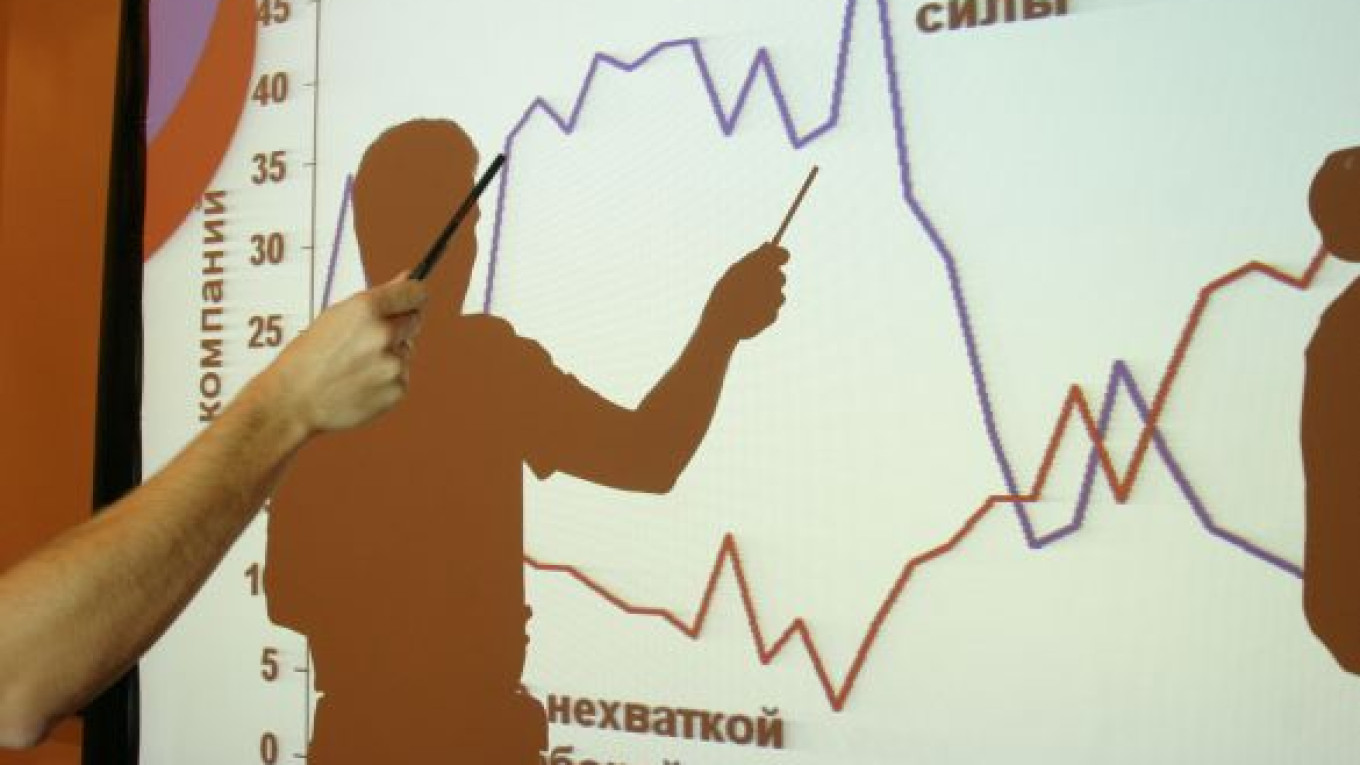Russia's economic expansion eased in the second quarter to the slowest pace in a year as weaker growth in China and Europe's debt crisis curbed demand for its commodities exports.
Gross domestic product rose 4 percent from a year earlier, the weakest pace since the same quarter of 2011 and down from 4.9 percent in the January-March period, the State Statistics Service said Friday.
Russia is relying on domestic demand to propel expansion as the debt crisis in Europe and slowing growth in China sap demand for raw materials.
"A slowdown in the second quarter and furthermore in the second half is certainly in the cards," Dmitry Polevoi, chief economist for Russia and Kazakhstan at ING in Moscow, said before the release.
The contribution of foreign sales to economic growth "looks less certain, with exports hit by faltering demand from the EU," he said.
The MICEX Index of 30 stocks has gained 2.1 percent this year, lagging behind the MSCI Emerging Markets Index's advance of 6.5 percent.
The European Union, which accounts for 49 percent of Russian trade, is battling to stanch a debt crisis that's threatening to trigger another global slowdown.
Eurozone GDP will probably drop 0.3 percent this year before rising 1 percent in 2013, the European Commission said May 11.
Russia's trade surplus narrowed in June to the smallest since November 2010 as exports shrank to $40.8 billion, down from $45.2 billion in May, the Central Bank said Friday.
Russian industry growth decelerated to 1.9 percent in June from 3.7 percent the previous month, easing more than economists forecast. Fixed-capital investment rose 4.7 percent, down from 7.7 percent.
"Industry has continued to slow. This probably reflects troubles in European export markets but may also be due to a strong ruble," Neil Shearing, chief emerging markets economist for Capital Economics in London, said before the release.
Norilsk Nickel reduced second-quarter output of nickel by 8 percent from a quarter earlier, the company said in a July 30 statement.
U.S. steelmaker Alcoa predicted last month that growth would be slower in Russia because European demand remains uncertain and prices are low.
Accelerating wage growth, slowing unemployment and consumer optimism at the highest level in almost four years are driving private spending, which accounts for half of Russia's economy.
While "consumption growth is not slowing dramatically, current growth isn't enough to boost the second-quarter GDP figure," Vladimir Miklashevsky, an economist at Danske Bank in Helsinki, said by e-mail. "We don't expect any acceleration in consumption growth, as inflation is speeding up."
Consumer prices grew at the fastest rate this year in July, accelerating from 4.3 percent the previous month to 5.6 percent, near the top end of the Central Bank's target range of 5 to 6 percent.
The government may revise this year's economic-growth projection to 3.8 to 4 percent, more than the 3.4 percent previously forecast, Economy Minister Andrei Belousov said July 20.
GDP grew 3.9 percent in the second quarter, the ministry estimated last month.
A Message from The Moscow Times:
Dear readers,
We are facing unprecedented challenges. Russia's Prosecutor General's Office has designated The Moscow Times as an "undesirable" organization, criminalizing our work and putting our staff at risk of prosecution. This follows our earlier unjust labeling as a "foreign agent."
These actions are direct attempts to silence independent journalism in Russia. The authorities claim our work "discredits the decisions of the Russian leadership." We see things differently: we strive to provide accurate, unbiased reporting on Russia.
We, the journalists of The Moscow Times, refuse to be silenced. But to continue our work, we need your help.
Your support, no matter how small, makes a world of difference. If you can, please support us monthly starting from just $2. It's quick to set up, and every contribution makes a significant impact.
By supporting The Moscow Times, you're defending open, independent journalism in the face of repression. Thank you for standing with us.
Remind me later.


